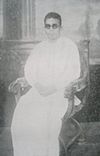Tamil Nadu state assembly election, 1967
|
|
|||||||||||||||||||||||||||||||
|---|---|---|---|---|---|---|---|---|---|---|---|---|---|---|---|---|---|---|---|---|---|---|---|---|---|---|---|---|---|---|---|
|
|||||||||||||||||||||||||||||||
|
All 234 seats in the Tamil Nadu Legislative Assembly |
|||||||||||||||||||||||||||||||
|
|||||||||||||||||||||||||||||||
|
|||||||||||||||||||||||||||||||
The fourth legislative assembly election of Madras State (later renamed as Tamil Nadu) was held in February 1967. The Dravida Munnetra Kazhagam (DMK) led coalition under the leadership of C.N. Annadurai won the election defeating the Indian National Congress (Congress). Anti-Hindi agitations, the rising prices of essential commodities and a shortage of rice were the dominant issues. K. Kamaraj's resignation as the Chief Minister in 1963, to concentrate on party affairs, along with persistent rumours of corruption had weakened the incumbent Congress Government. This was the second time after Communist Party of India winning Kerala assembly elections in 1957, for a non-Congress party to gain majority in a state in India, and the last time that Congress held power in Tamil Nadu. It marked the beginning of Dravidian dominance in the politics of Tamil Nadu. Annadurai, who became the first non-Congress chief minister of post-independence Tamil Nadu, died in office in 1969 and V.R. Nedunchezhiyan took over as acting chief minister.
The Congress party began to show weakness in the years after the 1962 election. In the summer of 1962, DMK conducted demonstrations against rising prices. These demonstrations turned violent throughout the state leading to the arrest of 6500 DMK volunteers, 14 members of the assembly and four members of the Lok Sabha, including Annadurai.
Kamaraj resigned the Chief Ministership in 1963 to assume the presidency of the All India Congress Committee and was replaced by M. Bakthavatsalam. Robert L. Hardgrave, Jr. (Temple Professor Emeritus in the Humanities, Government and Asian Studies from the University of Texas) wrote in an article published in the journal Pacific Affairs, that M. Bhaktavatsalam did not have the personal charisma or political acumen of Kamaraj. Persistent rumours of corruption tarnished the image of the Government. In October 1964, the food crisis brought the popularity of the Congress Government to an all time low.
...
Wikipedia

